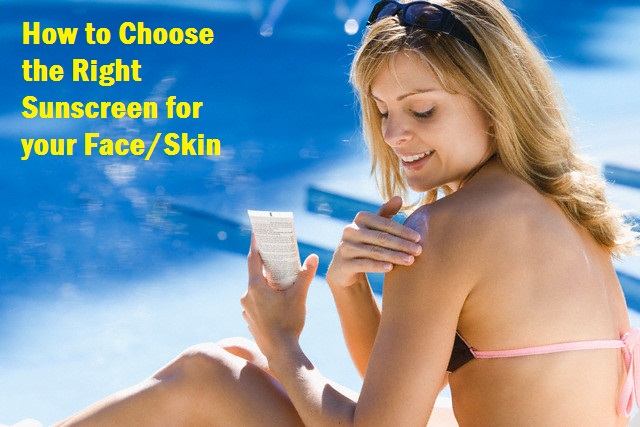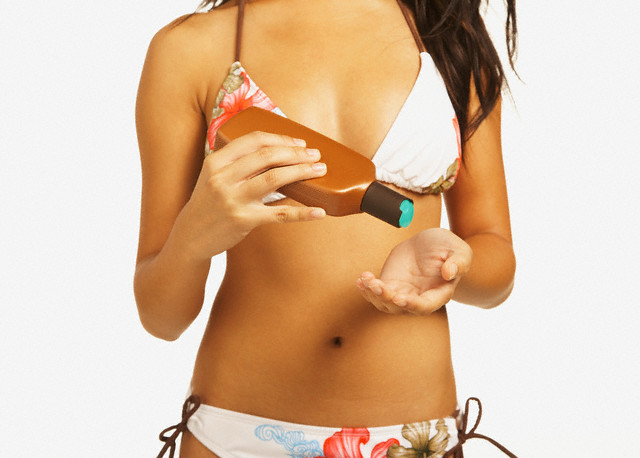How to pick or choose the right Sunscreen for your Face/Skin
Summer is a season when the power of the sun is just so high. Your skin is prone to get affected by the harmful UV rays. UV rays could cause harmful effects on your skin, which may even lead to skin cancer. So, it is really essential to protect your skin. The best remedy is to use a sunscreen each time you step out in to the sun. Getting a good sunscreen is really essential. So, how do you choose the perfect sunscreen for your skin? Well, here are a few things that you need to look out for in a good sunscreen lotion.
What does the Sun Protection Factor (SPF) mean?
SPF stands for Sun Protection Factor, and it is shown on the bottle of your sunscreen. A higher SPF does not actually mean better protection. A sunscreen with SPF more than 15, but lesser than 50 is considered to be optimum. According to studies, a sunscreen with an SPF of more than 50 does not offer any protection. Doctors say that a higher number of SPF gives the users a wrong impression that the sunscreen will last longer than ones with a lower SPF. As such, they do not reapply the cream often. This causes the risk for sunburns after long hours.
Broad Spectrum Sunscreens:
The UVB rays of the sun cause your skin to burn and also cause tanning. This is the main reason for skin cancer among so many people. UVA rays do not cause any sunburns, but they penetrate really deep in to your skin. This leads to all signs of ageing on your skin. You get wrinkles, your skin get leathery and saggy, and even sun spots are formed. A good sunscreen should be able to offer protection against both types of UV rays. So, look for a sunscreen which shows “broad spectrum”, or “broad spectrum UVA/UVB” on it label.
Water Resistant sunscreens:
If your skin is prone to sweating, or you plan to spend time in the waters, the sunscreen you choose must definitely be water resistant. Sunscreens are never waterproof. They will be able to protect you for a maximum of about 40 to 80 minutes under water. As such, you will need to reapply your sunscreen whenever you take a dip in the water.
About Chemicals and Ingredients in Sunscreen:
Sunscreens contain a lot of ingredients. You need to know the content of your sunscreen to choose one which does not affect your skin in any manner. Here are a few chemicals that you need to avoid. So, if your bottle contains any of the following chemicals, do not use it.
- Oxybenzone
Oxybenzone works really well at absorbing the UV rays of the sun. But, it is bad for your health. This chemical has the capacity to get absorbed by the skin, and it gets in to your bloodstream in this manner. According to toxicology and EWG experts, this chemical affects your hormones and disrupts them, damages your body cells, and may eventually cause skin cancer.
- Retinyl Palmitate
This is a type of Vitamin A. if this used on skin, and the skin is exposed to sun, it has the capability to cause skin cancer. Studies have been done on animals to prove this fact. Moreover, retinyl palmitate does not increase the capacity of the sunscreen in any manner according to the EWG. So, there is no use in using sunscreens that contain this chemical as it does more harm than good. So, avoid it.
- Parabens
Parabens are used widely in all kinds of cosmetic products as a preservative. They protect the product against microbial growth. The working of parabens is similar to the hormone estrogen, and that increases the risk for breast cancers. Even though the link of this chemical to cancers has not been validated yet, it has been found in breast tumors. The effects of parabens are not actually found, so better be on the safe side and avoid them.
Recommended Sunscreens from us:
Well, it is not that easy to get to a conclusion about which sunscreen you must buy. for your ease, here is a list of sunscreens that are safe and effective, and are on top of EWGs lsit of best sunscreens. They are paraben free too.
- Alba Botanica Natural Very Emollient Sunblock, Fragrance Free, SPF 30
- All Terrain AquaSport Face Stick, SPF 28
- Badger Broad Spectrum Sunscreen, Lavender, SPF 34
- Nature’s Gate Aqua Block Sunscreen Lotion, SPF 50
- Thinksport Sunscreen, SPF 50+
- Jason Pure Natural Sun Mineral Natural Sunscreen, SPF 30
- Kiss My Face Natural Mineral Sunscreen With Hydresia, SPF 40
How to Apply Sunscreen on your body:
A number of sunscreens are available, that claim to be a combo of sunscreen and bug repellent. This may be a good way to get both the advantages, but keep in mind that bugs may not even be a big problem during the peak hours in the sun. Moreover, sunscreens even require frequent application to get all benefits. Using the chemicals for bug repellents so frequently on your face is not a good idea. So, better stay away such combo sunscreens.
Spray-on sunscreens are available in the market, which can be easily used by spraying on to your face. It can also be applied on areas that are hard to reach, like your back. A disadvantage is that you cannot determine if you have put enough lotion. You may not even realize if you have missed out any areas. Another risk involved is that sprays and powders can be inhaled unknowingly. So, it is a better idea to stick to the regular lotions. Take a small amount of the size of a shot-glass. Apply this at least half an hour before you step out in to the sun. Every 2 hours, you will need to reapply the sunscreen to get enough protection. In case of swimming or excessive sweating, reapply it each time.
Make sure you keep all these tips in mind before selecting a sunscreen. Look out for the one that suits your skin, and even do a small patch test to determine allergies, if any. Use only a good sunscreen and keep your skin healthy and fresh.





